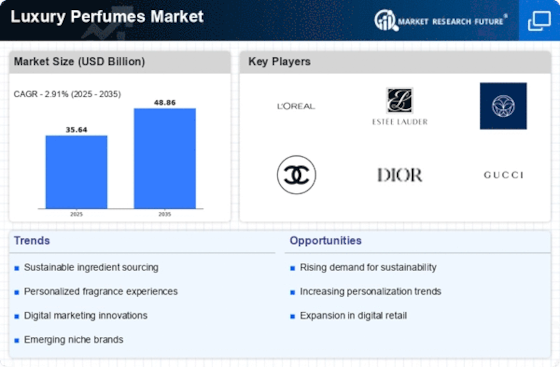Top Industry Leaders in the Luxury Perfumes Market

Market share analysis in the luxury perfumes segment is influenced by critical factors such as brand prestige, the quality and uniqueness of fragrance compositions, and the ability to resonate with the discerning tastes of luxury consumers. Pricing strategies play a pivotal role, with companies offering a range of luxury perfumes across different price tiers to appeal to diverse consumer segments. Establishing robust partnerships with high-end retailers, duty-free outlets, and exclusive boutiques is essential for market share, ensuring widespread product accessibility and visibility in key markets.
While established players dominate the luxury perfumes market, new and emerging companies are entering the space with innovative approaches. These entrants often focus on niche markets, unique scent profiles, and sustainable and ethical practices to differentiate themselves. The agility of these emerging companies allows them to swiftly adapt to changing consumer preferences, challenging the market dominance of established brands and contributing to the overall dynamism of the market.
Industry news within the luxury perfumes market frequently highlights exclusive fragrance launches, collaborations with designers, and evolving consumer trends. Companies regularly introduce limited-edition perfumes, engage in partnerships with renowned perfumers, and leverage digital platforms for targeted marketing campaigns. Regulatory updates related to ingredient safety, environmental sustainability, and animal welfare shape industry dynamics, prompting companies to align their practices with evolving standards and regulations.
Current trends in company investments within the luxury perfumes market reflect a notable focus on sustainability, technology integration, and digital marketing. Companies allocate resources to source responsibly harvested raw materials, explore eco-friendly packaging solutions, and adopt digital marketing strategies for personalized consumer engagement. Strategic marketing initiatives, including influencer collaborations and immersive fragrance experiences, are employed to strengthen brand presence and resonate with the target consumer demographic. Investments in technology, such as virtual fragrance try-ons and artificial intelligence for personalized recommendations, align with the growing demand for innovative and personalized luxury experiences.
The overall competitive scenario in the luxury perfumes market remains dynamic, with companies navigating evolving consumer preferences, sustainability expectations, and technological advancements. Established players face the challenge of maintaining and enhancing brand exclusivity and fragrance innovation in a market where emerging companies are capitalizing on unique scent profiles and sustainability initiatives. The competition is expected to intensify as new entrants gain recognition, introducing fresh perspectives and challenging the market share of established brands. In this environment, adaptability, responsiveness to fragrance trends, and a commitment to innovation and sustainability will be crucial for companies to maintain and enhance their competitive positions in the luxury perfumes market.
Industry News and Investment Landscape:
- Acquisitions in the recent past, such as L'Oréal's acquisition of Valentino Beauty, point to market consolidation patterns.
- A focus on potential growth sectors is shown by increased investments in digital marketing campaigns, sustainable production facilities, and e-commerce platforms.
- Growing celebrity partnerships and influencer marketing on social media platforms increase brand recognition and draw in younger consumers.
Key Companies in the Luxury Perfumes Market include –
- L’Oreal S.A.
- Procter & Gamble Company
- Perfumania Holdings Inc.
- Natura Cosméticos S.A.
- Bvlgari
- LVMH
- Gucci
- Elizabeth Arden Inc.
- Prestige Beauty
- Firmenich
- DIOR
- Salvatore Ferragamo
- Coty Inc.
- Calvin Klein Inc.
- Avon Products Inc.
- ICR Spa
- Chanel
- Chanel S.A.
- Amore Pacific











